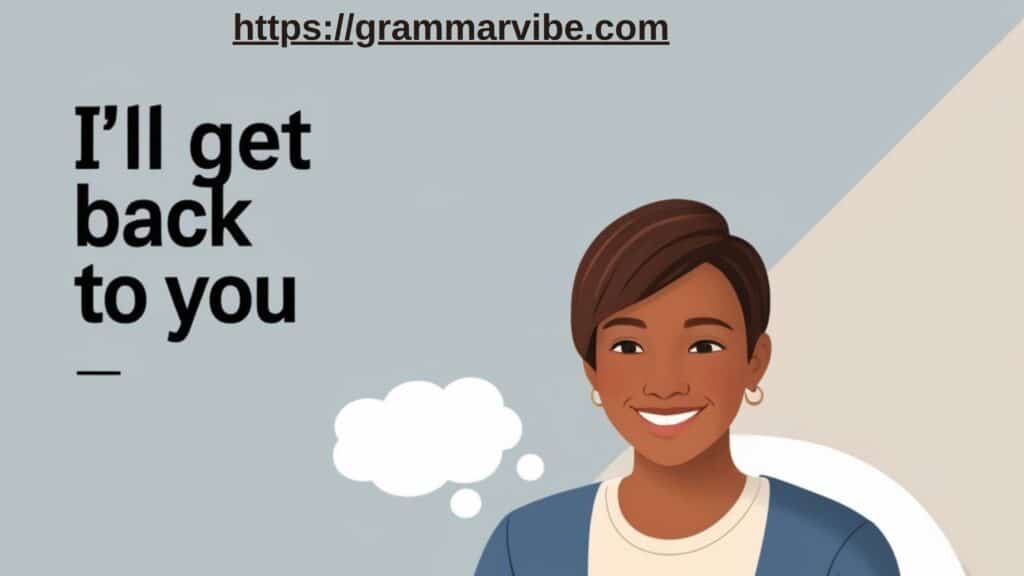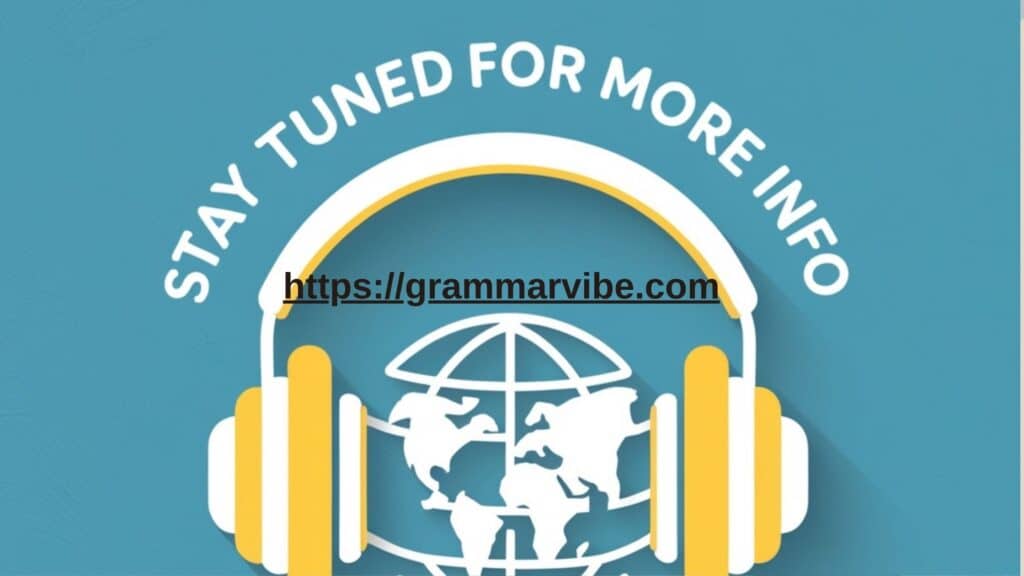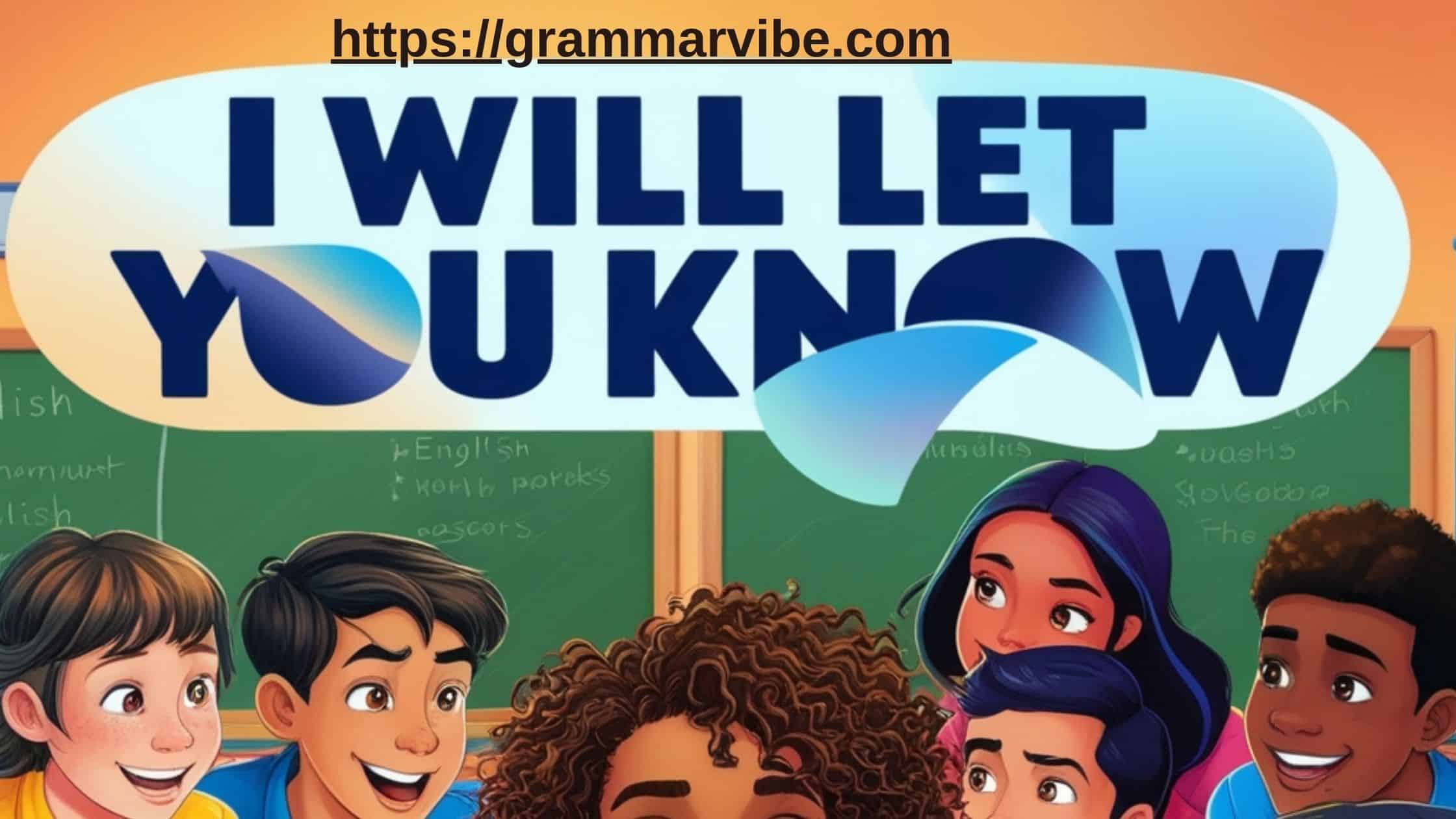In professional communication, it’s important to have a range of ways to express the idea of keeping someone informed. Saying “I will let you know” is fine, but using a variety of expressions can help keep communication fresh, clear, and engaging. Whether in emails, meetings, or phone calls, choosing the right words can foster better collaboration and encourage more effective communication.
Here are 15 alternative ways to say “I will let you know” in different professional contexts. Each one will be accompanied by a scenario example to show how it might fit naturally into your daily communication.
I’ll Keep You Posted
When you want to emphasize ongoing communication, saying “I’ll keep you posted” is an excellent choice. It signifies your commitment to providing updates as new information becomes available.
Example Scenario:
You’re working on a project with a colleague, and you’re waiting on some approval. You can say:
Subject: Update on Project X Approval
Hi Emily,
I’m still waiting for confirmation from the finance team. I’ll keep you posted as soon as I hear anything.
Best regards,
Mark
By saying “I’ll keep you posted,” you reassure the recipient that they will stay informed about the status of the situation.
I’ll Update You Soon
This phrase conveys a sense of timely information and indicates that updates will be provided in the near future. It sets clear expectations for when the recipient can expect more details.
Example Scenario:
After a meeting where some decisions were postponed, you could say:
Subject: Follow-up on the Client Proposal
Hi Jack,
I’ll update you soon on the feedback from the client. They should be getting back to us by tomorrow, so I’ll reach out once I have news.
Best,
Sarah
Using this phrase ensures the recipient understands that an update is imminent and that clear communication is your priority.
I’ll Inform You Later
If you’re not ready to provide an update just yet but want to acknowledge that the conversation isn’t over, saying “I’ll inform you later” is an appropriate choice. It implies thoughtful engagement and respect for the recipient’s need for information.
Example Scenario:
In a meeting, you may need more time to gather data. You could say:
Subject: Next Steps for the Marketing Campaign
Hi Lisa,
We’ll need a few more days to pull the necessary metrics. I’ll inform you later once I’ve gathered everything we need.
Thanks,
John
This approach works well when you’re managing expectations about the timing of updates.
I’ll Get Back to You

“I’ll get back to you” is a polite way of telling someone that you’ll respond after some consideration or research. It’s particularly useful when you don’t have all the information at hand yet but plan to provide it later.
Example Scenario:
A colleague asks for some detailed information you need to check. You could respond with:
Subject: Information Request
Hi Tom,
I don’t have the exact figures right now, but I’ll get back to you as soon as I’ve verified them.
Best,
Laura
This shows your responsiveness while maintaining professionalism.
More for you: 15 Other Ways to Say “It Was a Pleasure Working with You”
I’ll Touch Base With You
This expression indicates a plan to reconnect and discuss something further. It’s especially useful when you want to keep the conversation open or if a follow-up meeting is required.
Example Scenario:
During a project update call, you may say:
Subject: Project Update
Hi Grace,
I know we didn’t have time to go over everything today. I’ll touch base with you next week to cover the remaining points.
Regards,
Sophie
This shows that you’re committed to ongoing communication and encourages collaboration.
I’ll Share the Details
When you have information that you can’t share immediately but want to indicate that it’s forthcoming, “I’ll share the details” is a solid choice. It sets expectations for information sharing and suggests that the recipient will receive everything they need soon.
Example Scenario:
You’re working on a proposal with a client and need to clarify some points before sharing the final version. You might say:
Subject: Proposal Details
Hi Michael,
I’m finalizing the last details of the proposal. I’ll share the details with you tomorrow once everything is ready.
Best,
Claire
This sets a clear timeline for follow-up and reinforces your commitment to updates.
I’ll Fill You In
“I’ll fill you in” is an informal but effective way to let someone know that you’ll provide more details later. This is a great choice when you want to sound approachable but still communicate the need for more information.
Example Scenario:
You missed a meeting and need to catch up with a colleague. You could say:
Subject: Meeting Recap
Hey Ben,
I wasn’t able to attend the meeting, but I’ll fill you in as soon as I get the notes from the team.
Cheers,
Rachel
This approach is conversational while still conveying your intention to share important updates.
For your interest: 15 Other Ways to Say “I Was Born and Raised”
I’ll Let You In On It
This phrase works when you want to share something exclusive or important. It implies a sense of trust and a willingness to share key information.
Example Scenario:
If you’re preparing to share new developments in a project, you might say:
Subject: Upcoming Changes in the Project
Hi Olivia,
There are some changes coming up in the project timeline. I’ll let you in on it as soon as I have the official details.
Best,
George
This shows that you value the other person’s input and want to ensure they are informed promptly.
I’ll Notify You
This straightforward phrase works well when you need to indicate that you’ll be notifying someone about important updates. It’s often used when dealing with logistical or formal information.
Example Scenario:
If there are upcoming changes to a company policy, you can say:
Subject: Policy Changes Announcement
Hi David,
I’ll notify you once the new policy has been finalized. Please stay tuned for further updates.
Regards,
Emma
This emphasizes your intention to keep the recipient in the information loop.
I’ll Circle Back to You
This phrase works well when you want to revisit a topic at a later time, either for clarification or follow-up. It helps manage expectations about the timing of the next update.
Example Scenario:
You’re waiting for more input before you can give a complete response. You might say:
Subject: Update on Client Meeting
Hi Sophie,
I’ll circle back to you once I’ve had a chance to review the client’s feedback and provide a response.
Best,
James
It’s a polite and professional way to acknowledge the need for more time while keeping the recipient engaged.
You might also like: 15 Other Ways to Say “Including But Not Limited To”
I’ll Keep You in the Loop
This is a great way to communicate that the recipient will stay informed as things progress. It fosters a sense of inclusion and collaboration in decision-making processes.
Example Scenario:
During a long-term project, you can say:
Subject: Status Update on Product Launch
Hi Maria,
We’re making progress on the product launch. I’ll keep you in the loop as we hit key milestones.
Best regards,
John
This phrase promotes openness and transparency, which are key to fostering trust.
Stay Tuned for More Info

This phrase is more casual but effective in creating anticipation for updates. It works well in situations where you want to engage the recipient and keep their interest.
Example Scenario:
You’re teasing upcoming news or events. You could write:
Subject: Exciting Upcoming News
Hey Dave,
We’re working on something big! Stay tuned for more info coming your way later this week.
Cheers,
Rebecca
This creates excitement and encourages the recipient to stay connected.
I’ll Get Back to You With More Information
This phrase is a professional way to express that you’re gathering more details and will provide them as soon as possible. It’s often used in business interactions.
Example Scenario:
If you’ve been asked to provide additional documentation for a project, you could say:
Subject: Documentation for Upcoming Project
Hi Sarah,
Thanks for your patience. I’ll get back to you with more information by the end of the day tomorrow.
Best regards,
Leo
This ensures clarity in communication methods and timing.
Check out this: 15 Other Ways to Say “I Am Interested in This Position”
I’ll Get Back to You After I’ve Had a Chance to Review
This is an excellent choice when you need time to look over something before responding. It shows that you’re committed to providing a thorough and clear response.
Example Scenario:
After receiving an inquiry, you might respond with:
Subject: Inquiry on Product Specifications
Hi Kate,
I’ve received your questions about the product specs. I’ll get back to you after I’ve had a chance to review the documentation.
Best,
Anna
This ensures the other party knows that you are giving their query consideration before replying.
I’ll Update You When I Know More
This is a great way to communicate that the situation is still evolving, and you will provide more details once they are available. It’s a good way to maintain transparency and engagement.
Example Scenario:
If you’re waiting for external confirmation, you could write:
Subject: Update on External Confirmation
Hi Michael,
I’m still waiting on the final confirmation from the vendor. I’ll update you when I know more.
Regards,
Paul
This keeps the communication open and reassures the recipient that they’ll receive the latest information as soon as possible.
Table: 15 Ways to Say “I Will Let You Know”
| Phrase | Description |
|---|---|
| I’ll Keep You Posted | Ongoing communication, updates as they arise |
| I’ll Update You Soon | Commitment to timely information |
| I’ll Inform You Later | Information shared at a later time |
| I’ll Get Back to You | Follow-up after additional consideration |
| I’ll Touch Base With You | Reconnecting for more updates |
| I’ll Share the Details | Detailed information coming soon |
| I’ll Fill You In | Promise to provide thorough updates |
| I’ll Let You In On It | Sharing valuable or exclusive information |
| I’ll Notify You | Formal notification of updates |
| I’ll Circle Back to You | Revisiting a topic or providing further details |
| I’ll Keep You in the Loop | Ensuring transparency and information sharing |
| Stay Tuned for More Info | Building anticipation for upcoming information |
| I’ll Get Back to You With More Information | Providing updates after review |
| I’ll Get Back to You After I’ve Had a Chance to Review | Ensuring careful review before response |
| I’ll Update You When I Know More | Keeping informed as new details emerge |
Conclusion
Clear and effective communication is key in maintaining professional relationships. By using these alternative expressions to say “I will let you know,” you can demonstrate proactive engagement, commitment to updates, and a dedication to fostering trust.
Incorporating these phrases into your communication style will not only enhance your communication etiquette but also help you manage expectations and improve collaboration across the board. Whether in emails, meetings, or everyday professional interactions, the ability to communicate effectively will help build stronger work relationships, improve team dynamics, and increase productivity.

Kyren Paul is an experienced blogger and the creative mind behind “Grammar Vibe.” With a passion for the nuances of English grammar, he brings clarity and insight to everyday language topics, making grammar accessible and engaging for readers of all levels.











Leave a Comment